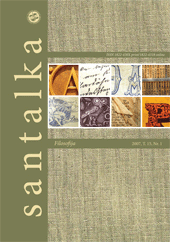Сказ языка как каз бытия: от Хайдеггера до постмодернизма
Lexicon of Language as Image of Being: From M. Heidegger to Postmodernism
Author(s): Lubov S. SysoyevaSubject(s): Philosophy
Published by: Vilnius Gediminas Technical University
Keywords: language; being; consciousness; information; presence; lexicon; hermeneutic; speech; thing; word; civilization; etherification; episteme; discourse; interpretation; text; mentality; image; postmodernism; culture; deconstruction.
Summary/Abstract: In the article M. Heidegger’s idea, that language is image of being and simultaneously its guidebook, is used. According to M. Heidegger’s concept, it is a poetic language following the principle: “There are no things where words are not present”. A. Toynbee submitted implicity of the language of being by the principle of etherefication (simplification), and in epistemology, according to M. Fuko, between a word and a thing different relations are established, depending on an epoch. In the Renaissance, intention goes from the world to the Word that is deciphered in Divine Logos. During New time, language collects the totality of the world within itself and acts as its Encyclopedia. In the Modernity, since the 19th century, interrelation between a word and understanding of being is mediated by such phenomena as a biological organism of a person and his work. In a superindustrial society, the coded stream of information testifies about a new temporal being, causing pictorial-verbal reloading of a person. Having presented the world as a text, the Postmodernism legitimated the number of earlier forbidden binary oppositions and has given a word to negativism of being. Russian artistic postmodernism made use of experience in the performed legitimation for deleting “a weak person” in the domestic culture with intention of creating a new type of culture because of unsuitability of the old one.
Journal: Santalka: Filologija, Edukologija
- Issue Year: 15/2007
- Issue No: 1
- Page Range: 11-24
- Page Count: 14
- Language: Russian

